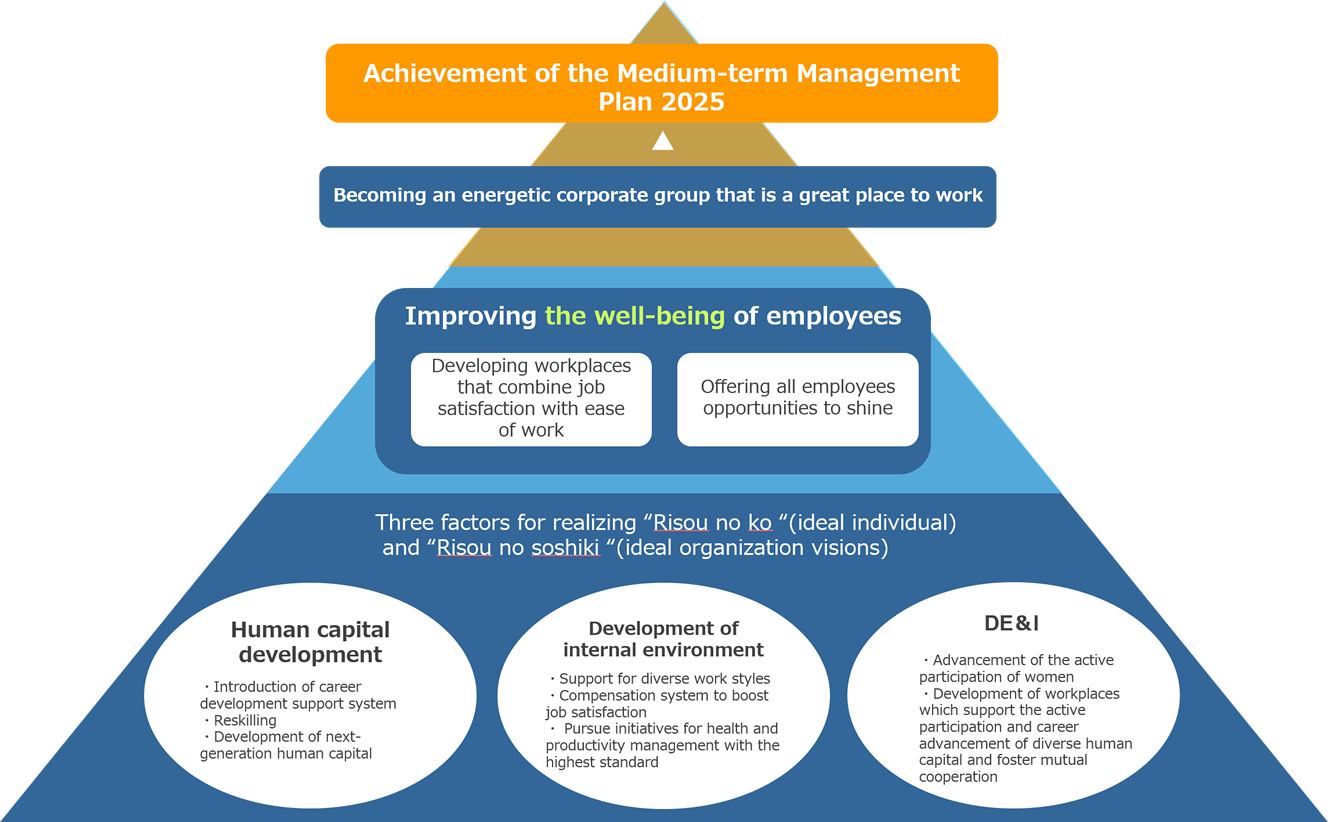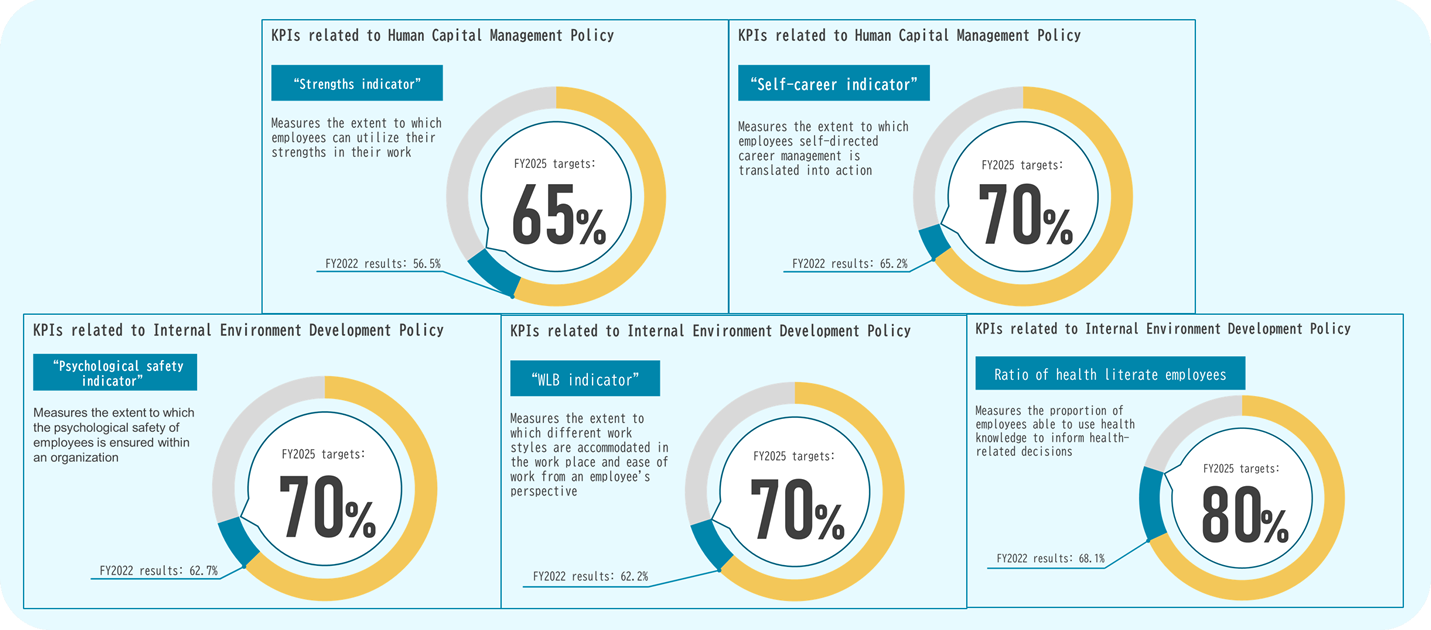Human Capital Management Policy
To become an energetic corporate group that is a great place to work by improving employee wellbeing through the implementation of human capital strategies:
“Risou no ko“(ideal individual) and “Risou no soshiki“(ideal organization).
* We regard each employee as an asset, which is why we refer to employees as human capital and not human resources.
The Group is investing in human capital, aiming to realize its vision of the “Risou no ko” (ideal individual) and its vision of the” Risou no soshiki” (ideal organization). For the realization of our ideals, we are focusing on support for autonomous professional development, work style reform, development of a corporate culture with emphasis on diversity, and health and productivity management measures.
Our two ideal visions
- Vision of the “Risou no ko “(ideal individual)
- Vision of the “Risou no soshiki “(ideal organization)
Our vision of the“Risou no ko “(ideal individual) is an employee who adapts to environmental change, is constantly striving for self-improvement, and is capable of autonomously advancing his or her career in order to achieve personal goals for enjoyment and satisfaction in life.
We aim for an organizational culture with high levels of engagement and team productivity whereby employees regardless of level of seniority cooperate with each other to solve issues through healthy conflict and flexible thinking for the achievement of goals.
Click on the image to enlarge.
Our main KPIs
We have adopted the following five indicators for the realization of our “Risou no ko “(ideal individual) and “Risou no soshiki “(ideal organization visions). Use of indicators to measure progress towards achievement of our visions and the smooth implementation of a PDCA cycle for human capital management will help us achieve our goals.
Click on the image to enlarge.
Strategy
- Policy for human capital development
The Group has adopted "an employee who adapts to environmental change, is constantly striving for self-improvement, and is capable of autonomously advancing his or her career in order to achieve personal goals for enjoyment and satisfaction in life" as its vision of the “Risou no ko” (ideal individual) and believes that employee autonomy is important for realizing this vision. We therefore respect the individuality and diversity of employees and will promote development with emphasis on autonomy including self-career development and support for skills development in response to environmental changes.
By encouraging employees to grow into the “Risou no ko” (ideal individuals) we envisage, we aim to improve the wellbeing of employees.
- Policy for internal environment development
The Group aims for an "organizational culture with high levels of engagement and team productivity whereby employees regardless of level of seniority cooperate with each other to solve issues through healthy conflict and flexible thinking for the achievement of goals" and believes that the diversity of human capital is important for the realization of this “Risou no soshiki” (ideal organization). We therefore advocate diversity management and by developing environments and designing systems to enable diverse human capital to actively participate and advance their careers regardless of gender, nationality, age or sexual orientation, we aim to increase ease of work and job satisfaction in the workplace.
We also recognize that good health and wellbeing and high energy levels provide the basis for employees' active participation and advancement in the work place. We therefore aim to improve the wellbeing of employees by supporting better health to boost wellbeing and energy levels and improve work performance, implementing safety and health management for peace of mind, safety and comfort in the workplace and promoting a good work-life balance and by being a leader in health and productivity management.
Risk management
Japan's working age population is shrinking year by year and it is likely to become more difficult to secure human capital in the future. The Group believes it is important to secure human capital in order to achieve sustainable improvement in corporate value and to implement human capital strategies linked to its management strategies.
We therefore aspire to be a company which treats the employees who underpin the Group as valuable assets and utilizes their individual strengths, based on the Human Capital Development Policy and Internal Environment Development Policy adopted as strategies. We will also seek the acquisition, retention and advancement of human capital and work to address any risks involved.
Metrics and targets
| The Group's Important KPI (by fiscal year) | Results | Targets | |||
|---|---|---|---|---|---|
| FY2022 | FY2025 | FY2030 | |||
| KPIs related to Human Capital Management Policy | Particularly important KPI | (1)“Strengths indicator”*1 | 56.5% | 65.0% | 70.0% |
| (2)“Self-career indicator”*1 | 65.2% | 70.0% | 80.0% | ||
| KPIs related to Internal Environment Development Policy | Particularly important KPI | (3)“Psychological safety indicator”*1 | 62.7% | 70.0% | 80.0% |
| (4)“WLB indicator”*1 | 62.2% | 70.0% | 80.0% | ||
| (5)Ratio of health literate employees*2 | 68.1% | 80.0% | 85.0% | ||
| Important KPI | Ratio of female managers*3 | 1.4% | 3.7% | 10.0% | |
| Ratio of female employees*3 | 26.6% | 28.0% | 30.0% | ||
| Ratio of male employees taking childcare leave*3 | 69.6% | 100.0% | 100.0% | ||
| Other KPI | Important KPI | Acquisition of human capital*4 | 96.4% | 100.0% | 100.0% |
| Retention of human capital*5 | 97.1% | 98.0% | 98.0% | ||
| Acquisition of midcareer talent (advancement of human capital)*6 | 34.5% | 40.0% | 50.0% | ||
| Ratio of midcareer hires*7 | 53.0% | 60.0% | 65.0% | ||
| Ratio of paid leave taken*8 | 67.4% | 75.0% | 80.0% | ||
*1 The ratio of positive questionnaire responses is used as an indicator.
*2 “WLB indicator”: Work Life Balance indicator Covers employees of the Company and all its consolidated subsidiaries
*3 Only Employees for TOKAI Holdings Corporation, TOKAI Corporation, TOKAI Communications Corporation, TOKAI Cable Network Corporation, TOKAI Gas Corporation, TOKAI Venture Capital & Incubation Corporation and TOKAI Management Service Corporation
*4 Employees Actual number of hires (including new graduate and mid-career hires) /Planned number of hires at beginning of period (including new graduate and mid-career hires)
*5 Employees Number of employees remaining at the end of the period/Number of employees at beginning of period
*6 Employees Ratio of mid-career hires to total number of employees in management positions
*7 Employees Ratio of mid-career hires to total number of new hires each fiscal year
*8 Period of aggregation: January 1, 2022 ~ December 31, 2022; employees of the TOKAI Group including consolidated subsidiaries



